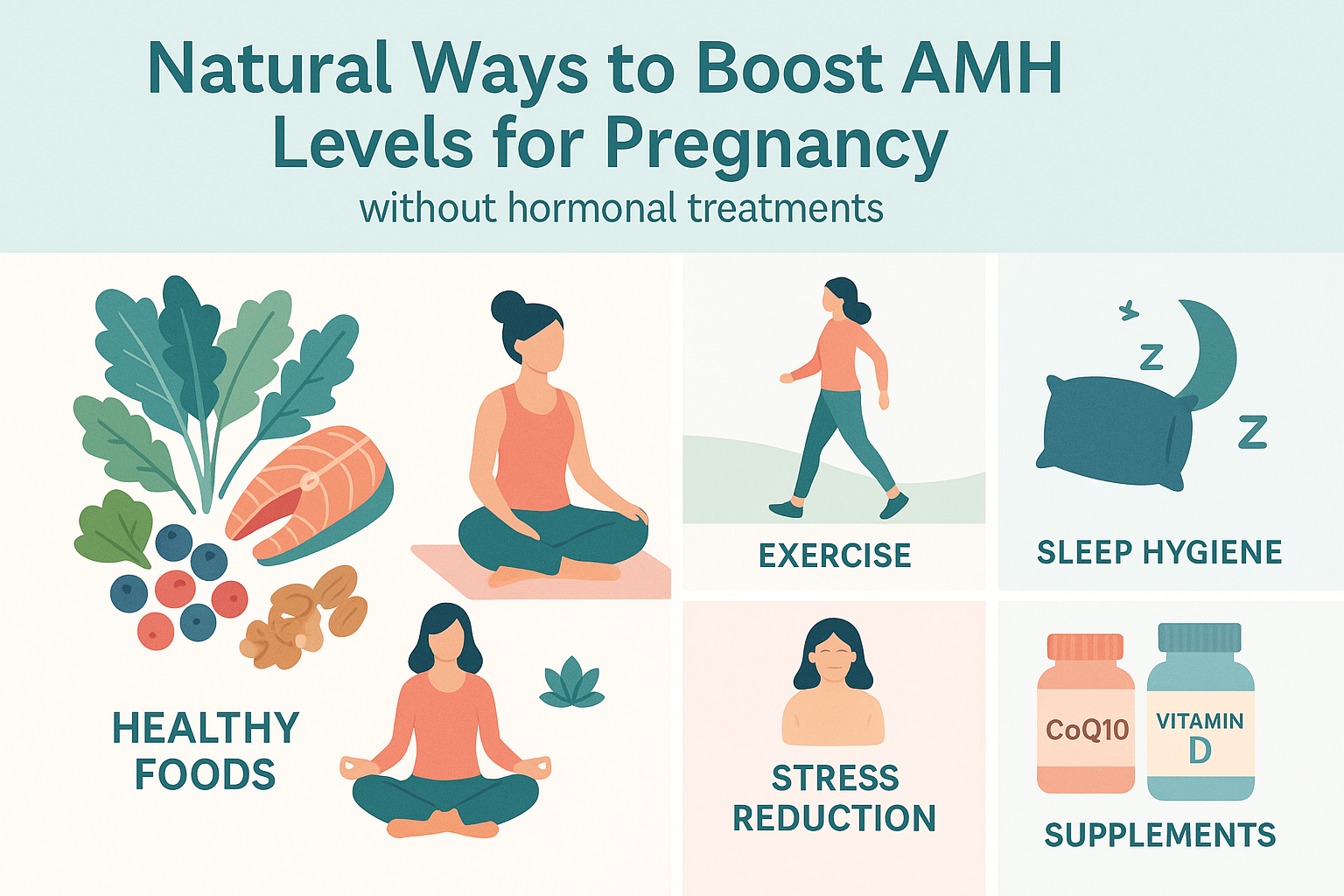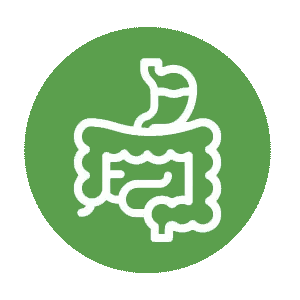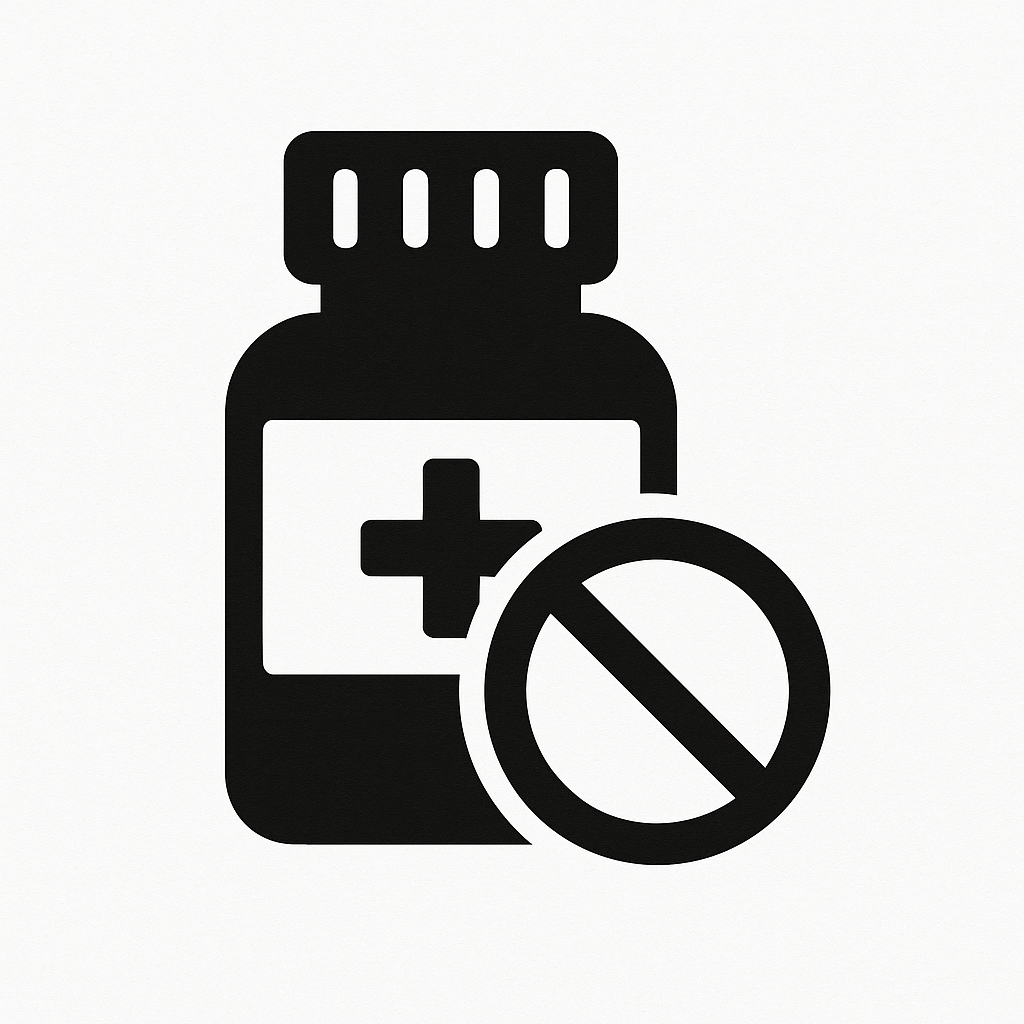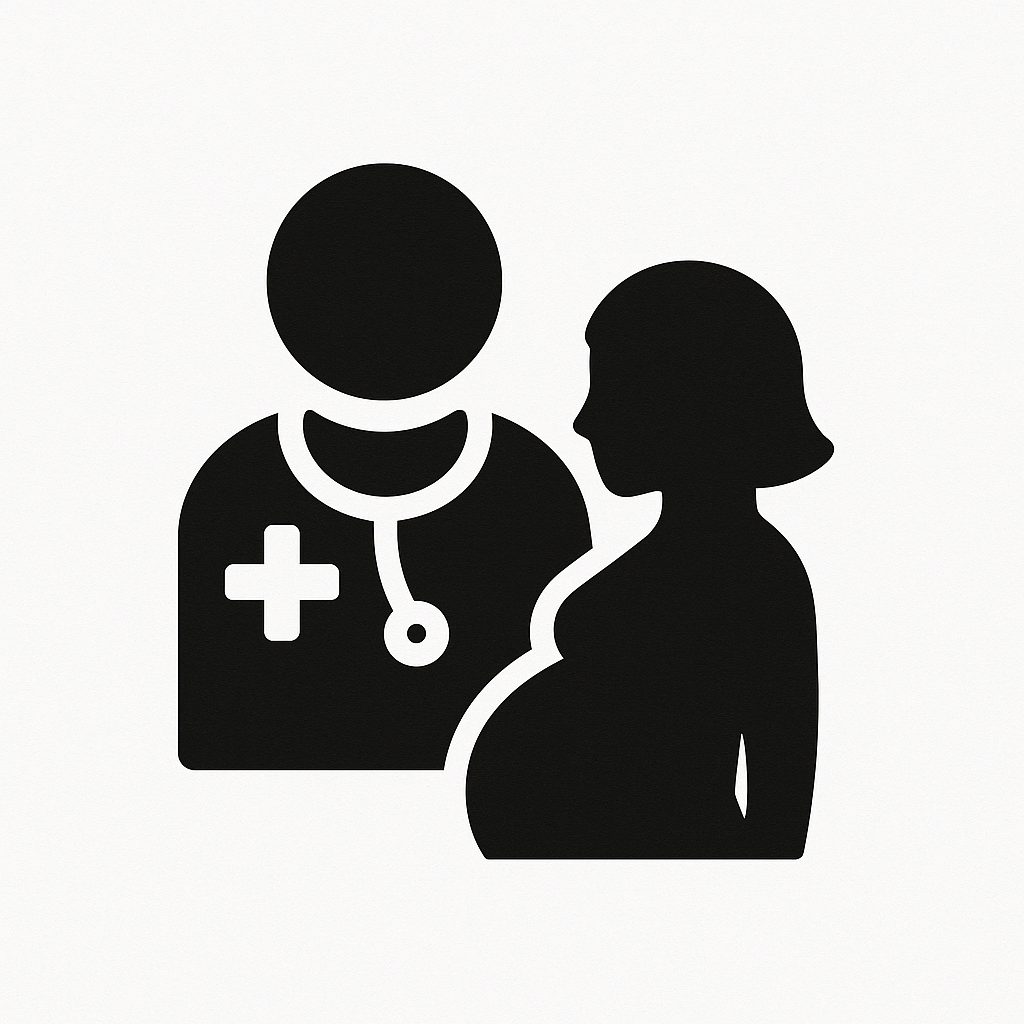
How to Boost AMH Levels For Pregnancy Without Hormonal Treatments
Anti-Müllerian Hormone, commonly known as AMH, has become one of the most talked-about markers in fertility assessment. This hormone, produced by the small follicles in your ovaries, serves as an indicator of ovarian reserve—essentially, how many eggs you have remaining. For women hoping to conceive, especially those facing fertility challenges, low AMH levels can feel like a devastating diagnosis.
But here's what many women aren't told: while you can't increase your total egg count, you can potentially support the health and quality of the eggs you have, and some research suggests certain natural interventions may positively influence AMH levels. More importantly, AMH is just one piece of the fertility puzzle, and many women with low AMH successfully conceive naturally.
This comprehensive guide explores evidence-based, natural strategies for supporting healthy AMH levels and optimizing fertility without hormonal treatments. While these approaches aren't guaranteed solutions—and fertility is complex with many contributing factors—they offer hope and actionable steps for women who prefer to explore natural options first or alongside conventional treatments.
Understanding AMH: What It Really Means
Before diving into strategies for supporting AMH levels, it's essential to understand what this hormone actually represents and what it doesn't.
AMH is produced by granulosa cells in the follicles of your ovaries. The level of AMH in your blood correlates with the number of antral follicles—small, resting follicles that could potentially mature and release eggs. Higher AMH levels generally indicate a larger pool of remaining eggs, while lower levels suggest a diminished ovarian reserve.
Doctors typically use AMH testing to assess ovarian reserve, predict response to fertility treatments like IVF, and estimate how much time a woman might have before menopause. Normal AMH levels vary by age but generally fall between 1.0-4.0 ng/mL for women in their reproductive years. Levels below 1.0 ng/mL are often considered low, while levels above 4.0-5.0 ng/mL might indicate conditions like polycystic ovary syndrome (PCOS).
However, AMH has important limitations. It measures quantity, not quality. You could have a high AMH but poor egg quality, or low AMH with excellent egg quality. AMH doesn't directly predict your ability to conceive naturally—many women with low AMH conceive without intervention. The hormone fluctuates throughout your cycle and can be influenced by factors like birth control use, vitamin D levels, and even time of year.
Most importantly, while AMH reflects your ovarian reserve, it doesn't determine your fertility destiny. Egg quality, uterine health, partner's sperm quality, timing of intercourse, overall health, and numerous other factors all contribute to conception success.
The Ovarian Reserve Reality: Setting Expectations
It's crucial to start with realistic expectations. The total number of eggs you're born with—your ovarian reserve—continuously declines throughout life and cannot be increased. You're born with approximately 1-2 million eggs, have about 300,000 at puberty, and this number steadily decreases until menopause.
So when we talk about "boosting AMH levels," we're not talking about creating new eggs. Instead, we're focusing on optimizing the health of existing eggs, potentially influencing the follicles that produce AMH, reducing factors that may accelerate egg depletion, and supporting overall reproductive health to make the most of the eggs you have.
Some research suggests that certain interventions may positively influence AMH levels, but mechanisms aren't always clear. Changes might reflect improved follicle health, reduced inflammation affecting ovarian function, or better detection of existing follicles rather than creation of new ones.
The goal isn't just higher AMH numbers—it's optimizing your overall fertility and reproductive health to give you the best possible chance of conception.
Nutritional Foundations for Reproductive Health
The foods you eat profoundly influence hormone production, inflammation levels, oxidative stress, and overall reproductive function. While no specific diet has been proven to directly increase AMH, certain nutritional patterns support optimal reproductive health.
The Mediterranean Diet Connection: Research has found associations between Mediterranean diet adherence and better fertility outcomes. This eating pattern emphasizes vegetables and fruits, whole grains, legumes, nuts and seeds, olive oil as the primary fat source, fish and seafood, and moderate amounts of poultry, eggs, and dairy, with minimal red meat and processed foods.
A study published in Human Reproduction found that women following a Mediterranean diet had higher success rates with assisted reproduction. While this study didn't specifically measure AMH, the anti-inflammatory and antioxidant-rich nature of this diet supports overall reproductive health.
Antioxidant-Rich Foods: Oxidative stress—an imbalance between free radicals and antioxidants—can damage eggs and accelerate ovarian aging. Antioxidant-rich foods help combat this damage. Prioritize deeply colored fruits and vegetables like berries, leafy greens, carrots, and tomatoes. Include nuts and seeds, particularly walnuts, almonds, and sunflower seeds. Green tea provides powerful antioxidants called catechins. Dark chocolate (70% cacao or higher) offers antioxidants along with minerals.
Healthy Fats Matter: Essential fatty acids, particularly omega-3s, support hormone production and reduce inflammation. Research published in the American Journal of Clinical Nutrition found that higher omega-3 intake was associated with better ovarian reserve markers. Include fatty fish like salmon, sardines, and mackerel 2-3 times weekly. Plant sources include walnuts, flaxseeds, and chia seeds. Consider an algae-based omega-3 supplement if you don't eat fish regularly.
Protein Quality: Adequate protein supports hormone production and overall cellular health. Focus on quality sources including fish and seafood, organic eggs, legumes and beans, nuts and seeds, and moderate amounts of organic poultry. Some research suggests plant-based proteins may be particularly beneficial for fertility compared to animal proteins, though balanced intake of both is reasonable.
Blood Sugar Balance: Insulin resistance and blood sugar instability can negatively affect ovarian function and potentially AMH levels. Stabilizing blood sugar involves limiting refined carbohydrates and added sugars, pairing carbohydrates with protein and healthy fats, choosing whole grains over refined grains, and eating regular meals rather than skipping or erratic eating patterns.
Foods to Minimize: Certain dietary factors may negatively impact fertility. Reduce or eliminate trans fats found in many processed foods, excessive caffeine (more than 200-300 mg daily), alcohol, which can affect hormone balance and egg quality, high-mercury fish like tilefish, swordfish, and king mackerel, and processed foods high in additives and unhealthy fats.
Targeted Supplements for Ovarian Health
While food should be your foundation, certain supplements have shown promise for supporting egg quality and potentially influencing AMH levels. Always consult a healthcare provider before starting supplements, especially if you're trying to conceive or have existing health conditions.
Coenzyme Q10 (CoQ10): This antioxidant compound is essential for cellular energy production, including in eggs. Research suggests CoQ10 supplementation may improve egg quality, particularly in women over 35. A study published in Fertility and Sterility found that CoQ10 supplementation improved ovarian response in women undergoing fertility treatment. The typical dose is 200-600 mg daily of ubiquinol (the active form) or ubiquinone. Effects may take 2-3 months as eggs take time to mature.
DHEA (Dehydroepiandrosterone): DHEA is a hormone precursor that some research suggests may improve ovarian function and egg quality in women with diminished ovarian reserve. Multiple studies have found that DHEA supplementation increased AMH levels in some women with low ovarian reserve. However, DHEA is a hormone and should only be used under medical supervision. Typical doses are 25-75 mg daily, but this requires professional guidance. Effects may take 3-4 months to manifest.
Vitamin D: Many women with fertility challenges have low vitamin D levels, and emerging research suggests a connection between vitamin D and AMH. Studies have found positive correlations between vitamin D status and AMH levels, though causation isn't proven. Vitamin D receptors are present in ovarian tissue, suggesting this nutrient plays a role in reproductive function. Have your levels tested—many experts recommend levels between 40-60 ng/mL for optimal fertility. Supplementation typically ranges from 1,000-4,000 IU daily, depending on current levels.
Myo-Inositol and D-Chiro-Inositol: These compounds, particularly in combination, have shown benefits for ovarian health, especially in women with PCOS. Research published in Gynecological Endocrinology found that inositol supplementation improved hormonal profiles and increased AMH levels in some women. The typical ratio is 40:1 myo-inositol to D-chiro-inositol, with total doses around 2,000-4,000 mg daily.
Omega-3 Fatty Acids: As mentioned in the nutrition section, omega-3s support reproductive health through their anti-inflammatory effects. If dietary intake is insufficient, supplementation with 1,000-2,000 mg daily of combined EPA and DHA can help. Choose high-quality, molecularly distilled fish oil or algae-based options to minimize contaminants.
N-Acetyl Cysteine (NAC): This antioxidant has shown promise for improving ovarian function, particularly in women with PCOS. Some studies suggest NAC may improve egg quality and hormonal balance. Typical doses range from 600-1,800 mg daily.
Alpha-Lipoic Acid: This powerful antioxidant may help protect eggs from oxidative damage. While research is limited, some fertility specialists recommend 300-600 mg daily as part of an antioxidant protocol for egg quality.
Folate and B Vitamins: Essential for DNA synthesis and cellular function, B vitamins support overall reproductive health. Use methylated forms (methylfolate rather than folic acid) for better absorption, especially if you have MTHFR gene variations. A good B-complex or prenatal vitamin covers these bases.
Lifestyle Factors That Influence Ovarian Health
Beyond nutrition and supplements, several lifestyle factors significantly impact reproductive health and potentially AMH levels.
Stress Management: Chronic stress elevates cortisol, which can disrupt reproductive hormones and potentially accelerate ovarian aging. Research has found associations between stress levels and fertility outcomes. Effective stress management strategies include mindfulness meditation, which has been shown to improve fertility outcomes in some studies. Yoga, particularly restorative practices, supports both stress reduction and hormonal balance. Regular gentle exercise like walking helps manage stress without overtaxing the body. Adequate sleep (7-9 hours nightly) is crucial for hormone regulation. Professional support through therapy or counseling addresses underlying stress and anxiety. Acupuncture may help reduce stress and support reproductive health.
Exercise Balance: Physical activity supports overall health, but the relationship with fertility requires balance. Excessive high-intensity exercise can negatively affect reproductive function, while moderate activity supports it. Aim for 150 minutes of moderate-intensity exercise weekly, including walking, swimming, yoga, or cycling at a comfortable pace. Avoid excessive high-intensity training, especially if you're underweight or have irregular cycles. Include strength training 2-3 times weekly to support metabolic health. Focus on movement that feels good rather than punishing exercise regimens.
Weight Optimization: Both underweight and overweight status can affect ovarian function and AMH levels. Maintaining a healthy BMI (generally 20-25, though individual variations exist) supports optimal reproductive function. If weight loss is needed, aim for gradual changes (1-2 pounds weekly) through balanced nutrition and moderate exercise rather than extreme diets. If you're underweight, working with a nutritionist to achieve healthy weight gain supports reproductive health.
Sleep Quality: Poor sleep disrupts hormone production and regulation. Research suggests that inadequate sleep can affect reproductive hormones and fertility. Prioritize consistent sleep schedules, going to bed and waking at similar times daily. Create a dark, cool sleeping environment. Limit screen time for 1-2 hours before bed, as blue light disrupts melatonin production. Avoid caffeine in the afternoon and evening. Consider magnesium supplementation (300-400 mg in the evening) to support sleep quality.
Environmental Toxin Reduction: Endocrine-disrupting chemicals in everyday products can affect reproductive health. Minimize exposure by choosing organic produce for the "Dirty Dozen" high-pesticide foods. Use glass or stainless steel for food storage rather than plastic. Select personal care products free from parabens, phthalates, and synthetic fragrances. Filter your drinking water to reduce contaminants. Avoid receipts and thermal paper that contain BPA. Choose natural cleaning products or make your own with simple ingredients.
Smoking and Alcohol: Both significantly impact fertility and ovarian reserve. Smoking accelerates ovarian aging and depletes egg reserve faster. If you smoke, quitting is one of the most important things you can do for fertility. Alcohol consumption, even moderate amounts, may affect fertility. Consider eliminating or minimizing alcohol when trying to conceive.
The Acupuncture and Traditional Chinese Medicine Approach
Acupuncture and Traditional Chinese Medicine (TCM) have been used for centuries to support reproductive health. While mechanisms aren't fully understood from a Western scientific perspective, research suggests potential benefits.
Several studies have found that acupuncture may improve ovarian function and hormonal balance. Research published in Medical Acupuncture found that acupuncture increased blood flow to the ovaries, which theoretically could support follicle health. Other studies suggest acupuncture may help regulate the hypothalamic-pituitary-ovarian axis, the hormonal feedback system governing reproduction.
A pilot study published in Complementary Therapies in Medicine found that women receiving acupuncture showed improvements in certain fertility markers, though results have been mixed across studies. Some research suggests acupuncture may specifically benefit women with diminished ovarian reserve.
Beyond needle acupuncture, TCM approaches include herbal formulas tailored to individual patterns of imbalance. Common herbs used for reproductive health include Chinese angelica (Dong Quai), peony, rehmannia, and others. These should only be used under guidance from a qualified TCM practitioner, as inappropriate use could be harmful.
The stress-reduction benefits of acupuncture may also indirectly support fertility by lowering cortisol and improving overall well-being.
If you're interested in acupuncture, seek a licensed acupuncturist with specific training and experience in fertility support. Plan for regular treatments over several months, as effects are typically cumulative.
Emerging Research and Promising Areas
Scientific understanding of AMH and ovarian health continues to evolve. Several emerging areas show promise, though more research is needed.
Mitochondrial Support: Eggs have the highest number of mitochondria of any cell in the body, and mitochondrial function is crucial for egg quality. Beyond CoQ10, other mitochondrial support strategies are being explored, including pyrroloquinoline quinone (PQQ), a compound that may support mitochondrial biogenesis. L-carnitine, which helps transport fatty acids into mitochondria for energy production. Resveratrol, an antioxidant found in grapes and berries. Research in this area is promising but still preliminary.
Melatonin: Known primarily as a sleep hormone, melatonin is also a powerful antioxidant present in follicular fluid. Some research suggests melatonin supplementation may improve egg quality and IVF outcomes, though effects on AMH specifically are unclear. Doses of 3-6 mg taken before bed are sometimes used in fertility protocols.
Growth Hormone: Some fertility clinics are exploring growth hormone supplementation for women with diminished ovarian reserve undergoing IVF. While this is a hormonal treatment (outside the scope of this natural approach article), the research suggests growth hormone may influence follicle development and potentially AMH production.
Stem Cell Research: Exciting preliminary research is exploring whether ovarian stem cells exist and could potentially generate new eggs, which would revolutionize understanding of ovarian reserve. This research is highly experimental and far from clinical application, but it represents an interesting frontier.
The Gut-Ovarian Axis: Emerging research suggests gut health and the microbiome may influence reproductive health through inflammatory pathways and hormone metabolism. Supporting gut health through probiotics, prebiotics, and anti-inflammatory nutrition may have indirect benefits for reproductive function.
When Natural Approaches May Not Be Enough
While natural strategies can support reproductive health, it's important to acknowledge when medical intervention may be necessary or beneficial.
If you're over 35 and haven't conceived after 6 months of trying, or under 35 and haven't conceived after 12 months, consult a fertility specialist. If you have very low AMH levels (below 0.5 ng/mL) or other markers of significantly diminished ovarian reserve, you may need to act more quickly. If you have irregular or absent periods, diagnosed fertility conditions, or your partner has male factor fertility issues, medical evaluation is important.
Natural approaches work best as preventive strategies or in cases of mild fertility challenges. They can also complement medical treatments—many women use natural strategies alongside IVF or other interventions.
Time is a crucial factor in fertility, especially for women over 35. While pursuing natural approaches, don't let valuable time pass if more aggressive intervention is warranted. A fertility specialist can help you understand your specific situation and create an appropriate timeline for trying natural approaches versus medical treatments.
Creating Your Personal AMH-Supporting Protocol
Based on the research and strategies discussed, here's a framework for creating your own natural protocol:
Foundation (Start Immediately):
- Transition to a Mediterranean-style, anti-inflammatory diet
- Eliminate smoking and minimize alcohol
- Optimize sleep to 7-9 hours nightly
- Implement stress management practices daily
- Begin moderate exercise if not already active
Month 1-2:
- Add a high-quality prenatal vitamin with methylfolate
- Begin vitamin D supplementation after testing your levels
- Incorporate omega-3s through diet or supplementation
- Start CoQ10 supplementation (200-600 mg daily)
- Consider beginning acupuncture treatments
Month 3-4:
- Evaluate progress and consider adding targeted supplements like myo-inositol, NAC, or others based on your specific situation
- Continue all foundational strategies
- Retest vitamin D and adjust dosing if needed
Month 5-6:
- Consider retesting AMH to evaluate any changes (though some practitioners suggest waiting longer)
- Assess overall health improvements, cycle regularity, and other fertility markers
- Decide whether to continue natural approaches, combine with medical intervention, or transition to medical treatment
Throughout this process, work with healthcare providers who support your approach and can monitor your progress. Regular monitoring of cycle regularity, basal body temperature, and other fertility awareness methods helps you understand your unique patterns.
The Whole Picture: Beyond AMH Numbers
Remember that fertility is about more than AMH levels. Focus on the complete picture of reproductive health including regular, healthy menstrual cycles, confirming ovulation through tracking methods, optimizing cervical mucus quality, maintaining a healthy endometrial lining, addressing partner's sperm health, timing intercourse appropriately, and overall physical and emotional well-being.
Many women with low AMH conceive naturally because they have good egg quality, optimal timing, supportive lifestyle factors, and sometimes, an element of luck. Conversely, women with normal AMH sometimes face fertility challenges due to other factors.
The strategies discussed in this article support overall reproductive health regardless of your specific AMH number. Even if your AMH doesn't significantly change, you're improving your fertility potential through multiple pathways.
Embracing the Journey
Facing low AMH or fertility challenges can feel overwhelming and isolating. Remember that you're not alone—many women navigate similar journeys and go on to have healthy pregnancies.
While pursuing natural strategies, maintain perspective and patience. Changes take time—egg quality improvements require at least 3-4 months as eggs mature from primordial follicles to ovulation. Some women see improvements more quickly, others need 6 months or longer. Stay flexible and open to adjusting your approach based on results and guidance from healthcare providers.
Connect with support—whether through online communities, local support groups, or professional counseling. The emotional aspect of fertility challenges is real and valid. Taking care of your mental health is as important as physical interventions.
Empower Your Fertility Journey
Your fertility journey is uniquely yours, and you have more influence over your reproductive health than you might think. While you can't control every factor, the natural strategies outlined in this article give you actionable steps to optimize your fertility potential.
Whether you're just beginning to think about conception, actively trying to conceive, or complementing medical fertility treatments, supporting your body with nutrition, targeted supplements, and healthy lifestyle practices provides a foundation for reproductive wellness.
Ready to take the next step in supporting your reproductive health naturally? Explore evidence-based women's health supplements at Matevara's Women's Health Collection. Their carefully formulated products provide comprehensive nutritional support for hormonal balance, egg quality, and overall reproductive wellness, helping you optimize your fertility naturally.
Disclaimer: This article is provided for informational and educational purposes only and does not constitute medical advice, diagnosis, or treatment recommendations. The information presented is based on current research and general knowledge about AMH, ovarian reserve, and fertility, but fertility is highly individual and complex. Before implementing any of the strategies discussed, including dietary changes, supplements, or lifestyle modifications, you should consult with qualified healthcare providers, particularly reproductive endocrinologists or fertility specialists who can assess your specific situation. This is especially critical if you have diagnosed fertility conditions, irregular menstrual cycles, known low ovarian reserve, are currently undergoing fertility treatments, have other medical conditions or take medications that could interact with supplements, or are pregnant or breastfeeding. Some supplements mentioned, particularly DHEA, are hormonal in nature and should only be used under medical supervision. The statements regarding supplements have not been evaluated by the Food and Drug Administration, and these products are not intended to diagnose, treat, cure, or prevent any disease. While the strategies discussed may support overall reproductive health, there is no guarantee they will increase AMH levels or result in pregnancy. Individual responses vary based on age, underlying fertility factors, genetics, overall health, and other circumstances beyond nutritional and lifestyle interventions. Time is a critical factor in fertility, particularly for women over 35, and pursuing only natural approaches when medical intervention is warranted could result in missed opportunities. This article is not intended to discourage appropriate medical evaluation or treatment, and nothing in this content should delay you from seeking professional medical care for fertility concerns. Fertility treatment decisions should be made in consultation with medical professionals who can provide personalized guidance based on comprehensive evaluation of your unique situation.
Share








